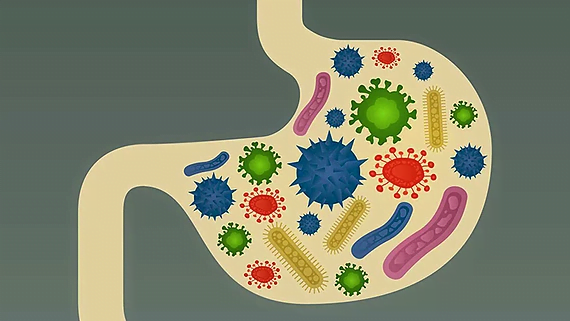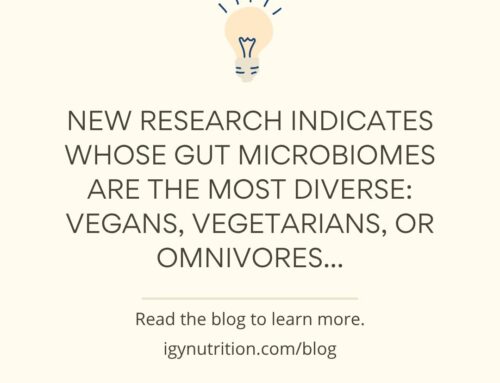We’ve all heard of inflammation, and research shows that it’s a bad sign for your health. But what does it have to do with the microflora in your gut?
It turns out that both are interconnected, and what impacts your microbiome is directly linked to inflammation as well.
We reached out to Dr. Susan Hewlings, Ph.D. to understand more about the role of a healthy gut in controlling inflammation and to find out ways to start improving digestive health today.
1. What is inflammation and how does it relate to different health issues?
As a central component of the immune system, inflammation serves as the body’s immediate response to injury.
It is marked by increased blood flow, capillary dilatation, leukocyte infiltration, and the localized production of chemical markers that act as messengers to initiate the elimination of toxins and repair of damaged tissue.

While inflammation is an essential component of the initial defense against a toxin or pathogen in the short term, a prolonged inflammatory response can be detrimental in the long term.
In fact, a chronic low-grade inflammatory state is a recurring feature of a wide range of chronic conditions, such as the metabolic syndrome (MetS), non-alcoholic fatty liver disease (NAFLD), type 2 diabetes mellitus (T2DM) and cardiovascular disease.
Although the association between inflammation and chronic health conditions is widely recognized; it is still unclear exactly how inflammation contributes to these conditions and serves as a risk factor for the development of disease.
But what is clear is that when chronic inflammation is resolved, outcomes for the associated disease improve.
2. How does gut flora impact inflammation?
Gut flora impacts inflammation through a complex interplay between three factors: – the microbiota
– the host immune system and
– immune-mediated markers of inflammation
So much so actually, that the interaction between the gut microbiota and the host immune system is vital for regulating and resolving inflammation.
Therefore, balancing the gut microbiome can be used as a therapeutic strategy for managing several gastrointestinal disorders, from IBS to general complaints of GI discomfort that are tied to inflammation.
Some of these therapeutic strategies include using prebiotics, probiotics, and postbiotics, and many doctors have used fecal microbiota transplantation (FMT) to effectively modify the gut flora.
Additionally, because inflammatory markers are released from fat tissue (such as TNF-α, IL-6, and leptin), obesity can also influence the microbiome, leading to immune system dysfunction and inflammation.
As a result, adverse alterations in the gut microbiota are linked to impaired gut barrier function and may promote the absorption of bacteria through the damaged and leaky gut.
The increased absorption of bacteria into the bloodstream consequently triggers chronic low-grade inflammation, leading to a host of gastrointestinal disorders as mentioned above.

3. What are your tips to avoid inflammation?
The population of gut microorganisms in the human intestine is affected by a variety of factors from birth through adulthood, of which some are known and others are unknown.
Also, the effect of diet can vary among individuals.
That being said, some basic recommendations have been identified:
-
Maintain a healthy weight to combat obesity-related inflammation.
-
Avoid excessive use of antibiotics to maintain a proper balance of microflora in the GI tract.
-
Consume a well balanced diet including a variety of vegetables.
-
Exercise regularly to help decrease body weight and therefore reduce inflammation.
-
Follow a Mediterranean diet, characterized by a high consumption of vegetables, olive oil and moderate consumption of protein, as it has been shown to be beneficial both in regulating a healthy gut and improving overall immune function.
Finally, important protective factors in the diet include whole grains, fiber, vegetables, fruits, fish, polyunsaturated fatty acids (PUFA), especially marine n-3 PUFA, vitamin C, vitamin E and carotenoids. Plant-derived flavonoids are also likely to be protective, hence the recommendation for a vegetable based diet.
Lucky for us, moderate alcohol consumption has been linked to decreasing low-grade inflammation as well! However, it is recommended that you avoid saturated fatty acids (especially from processed meats) and trans-fatty acids because these have been shown to stimulate inflammation.
Take a look at this infographic: 5 tips to avoid inflammation
4. What supplements, if any, would you recommend to avoid inflammation?
Probiotics and prebiotics can be used to help balance the gut microbiota which in turn helps to decrease inflammation.
Resveratrol, curcumin and green tea are other supplements that have also been shown to inhibit inflammatory markers produced by excessive fat tissue, and Omega 3 fatty acid supplements, especially marine derived, have been shown to have anti- inflammatory effects.
But most importantly, a balanced diet is the key to avoiding inflammation!
So there you have it! The bacteria in your gut have a strong influence on inflammation, and by supporting a healthy gut, you can keep chronic inflammation at bay.
The takeaway? Practice a healthy lifestyle by eating a well-balanced diet, exercising regularly, and using supplements like pre and probiotics to help maintain a happy gut!
Read our blog post on the best 6 foods for gut health
to start reclaiming your health!
References:
Vieira AT, Fukumori C, Ferreira CM. New insights into therapeutic strategies for gut microbiota modulation in inflammatory diseases. Clinical & Translational Immunology. 2016;5(6):e87-. doi:10.1038/cti.2016.38.
Khan MJ, Gerasimidis K, Edwards CA, Shaikh MG. Role of Gut Microbiota in the Aetiology of Obesity: Proposed Mechanisms and Review of the Literature. Journal of Obesity. 2016;2016:7353642. doi:10.1155/2016/7353642.
Minihane AM, Vinoy S, Russell WR, et al. Low-grade inflammation, diet composition and health: current research evidence and its translation. The British Journal of Nutrition. 2015;114(7):999-1012. doi:10.1017/S0007114515002093.
Calder, P.C., Ahluwalia, N., Brouns, F., Buetler, T., Clement, K., Cunningham, K., Esposito, K., Jönsson, L.S., Kolb, H., Lansink, M., Marcos, A., Margioris, A., Matusheski, N., Nordmann, H., O’Brien, J., Pugliese, G., Rizkalla, S., Schalkwijk, C., Tuomilehto, J., Wärnberg, J., Watzl, B. and Winklhofer-Roob, B.M. (2011) ‘Dietary factors and low-grade inflammation in relation to overweight and obesity’, British Journal of Nutrition, 106(S3), pp. S1–S78. doi: 10.1017/S0007114511005460.
Lyons CL, Kennedy EB, Roche HM. Metabolic Inflammation-Differential Modulation by Dietary Constituents. Nutrients. 2016;8(5):247. doi:10.3390/nu8050247.
Jiang J, Li K, Wang F, et al. Effect of Marine-Derived n-3 Polyunsaturated Fatty Acids on Major Eicosanoids: A Systematic Review and Meta-Analysis from 18 Randomized Controlled Trials. Sampson AP, ed. PLoS ONE. 2016;11(1):e0147351. doi:10.1371/journal.pone.0147351.
#prebiotics #bacteria #microbiome #beneficialbacteria #probiotics #gutflora #gut #diet #guthealth #foods




